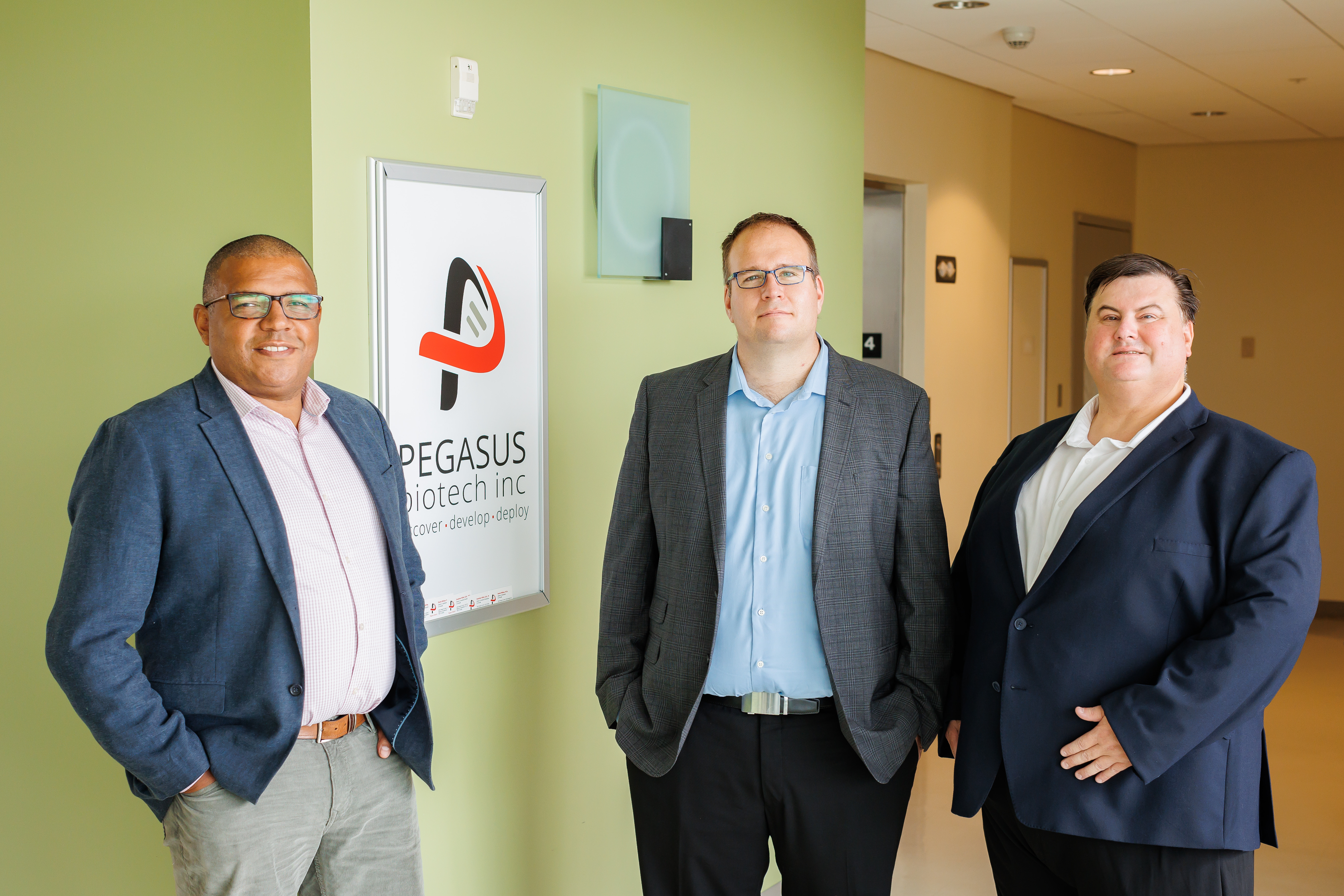Looking for lifestyle stability and job security, Jonathan Wilts co-founded Pegasus Biotech with Yimy Mena and Daniel Wilson. Career scientists, each with different complementary skills, the three co-founders built a business based on their unique experience and grew it through a commitment to research, relationships and innovation.
TLDR
-
Building and maintaining both internal and external relationships is necessary for long-term growth
-
Diversifying your product offering can smooth out cash flow and expand your appeal to different clients
-
Regularly updating your business plan can help you stay on track with your vision
As business partners, recognize and draw on unique expertise
Wilts, Mena and Wilson have gained experience many scientists in their position don’t have — they have all worked on products from early-stage development through licensing.
“I’ve been fortunate in that I’ve seen multiple products make it to market, which is fairly uncommon in biotech — I meet a lot of people who have worked in the sector for 40 years and nothing they have worked on has received approval,” Wilts says. “Clients feel confident that when they bring regulators in five years from now, the product will pass muster.”
Each co-founder’s unique skills contribute to a cohesive business. While Wilts serves as CFO and focuses on business development and marketing, Mena still does a fair bit of science and interacts with clients. Wilson, meanwhile, is more operationally focused and handles Biosafety, IT, HR, and quality management, among other things. “We have a very good working relationship,” says Wilts.
Diversify your offerings to drive growth
Pegasus’ bread and butter is building operational frameworks for conventional vaccine development — 60% of their work is for animal health and 40% for human health. A few months after they started their business, COVID hit — they got consulting work quickly and built the revenue they needed to start the business, setting up labs, buying equipment and hiring staff. “And we’ve been continuing to grow from there,” says Wilts.
Beyond vaccine development, as their clients sought additional capabilities, they expanded to address those needs. “As we become more and more capable and better known, people are willing to give us larger, higher value projects,” says Wilts. “That’s been a big part of our expansion.”
Another key to growing their business is building their own technology to create vaccines that cost less. “Over the last few years, we have developed a low-cost DNA plasmid technology that enables lower-cost vaccines to come to market,” explains Wilts.
Not only will this technology drive their expansion, but it may also help stabilize cash flow. “We expect it to drive some royalty rates, which is much more stable than doing a large project and getting paid half now, half later.” Wilts explains that in a high-value, low-volume business like theirs, cash flow stability isn’t always easy to come by. They access funding through grants to bridge gaps and finance projects and have worked with RBC to cover some expansion costs.
“The future is bright for Pegasus,” says Business Markets Manager Nick Kays. “They came to us at a critical time when their business was young and needed operating funds to continue growing. With a Royal Business Operating Line, they could cover cash flow gaps and take their business to the next level. We also provided multiple equipment term loans to continue expanding their business capabilities and target market.”
3 Grant Writing Tips for Small Business Owners from Pegasus Biotech
Does your business rely on grants to fund your projects? Pegasus co-founder Jonathan Wilts offers these tips:
1. Build relationships with funding agencies
“Like with other things, a successful grant comes down to relationship management. We spend a lot of time talking to the funding agencies and getting to know the people there.”
2. Be thorough in your plan or application
“We have always been very diligent in the plan we put together for the funders – it might be 50 pages long, including the market research, the R&D plan and a comprehensive budget.”
3. Do what you say you’ll do
“If you want to be successful with grant funding, a lot of it is about credibility – doing what you say you’re going to and moving meaningful projects forward.”
Develop international relationships to expand globally
Pegasus has been intentional about growing internationally. “We have intentionally invested in global expansion, spending money on branding, on our website, Google ads and Linked In,” explains Wilts. “We put a lot of time and effort into reaching out to clients and building relationships.” While there might not be a project initially, the Pegasus team makes a point of meeting potential clients in person, shaking their hands and getting to know them. “So, when they do have a need, they know who we are and will reach out,” he says, adding that their online presence adds to their profile and credibility. Currently, Pegasus has roughly 25 regular clients in eight different countries.
Lean into your business plan
With an expanding business, varying revenue streams and different sources of funding, the company’s business plan helps them stay focused and organized. “Our business plan is very comprehensive. It gets a major update once a year, as well as minor updates along the way.” Wilts explains that they have separate plans for their plasmid technology and their vaccine product development goals – an area they hope to expand into in the future.
Keep up your internal relationships
While building relationships with funders, prospects and clients is crucial for the success of their business, it’s equally important to maintain cohesion internally. With three partners, aligning on vision is vital. So is getting along. “Everyone listens. Everybody feels free to speak bluntly – and it works. But we are intentional about maintaining relationships – we make sure to take the time to go out for lunch on a regular basis or travel together to a scientific conference to make sure the relationship stays strong.”
Wilts and his co-founders consistently innovate and build relationships to grow their business. Read how other businesses have leveraged their expertise for long-term growth.






